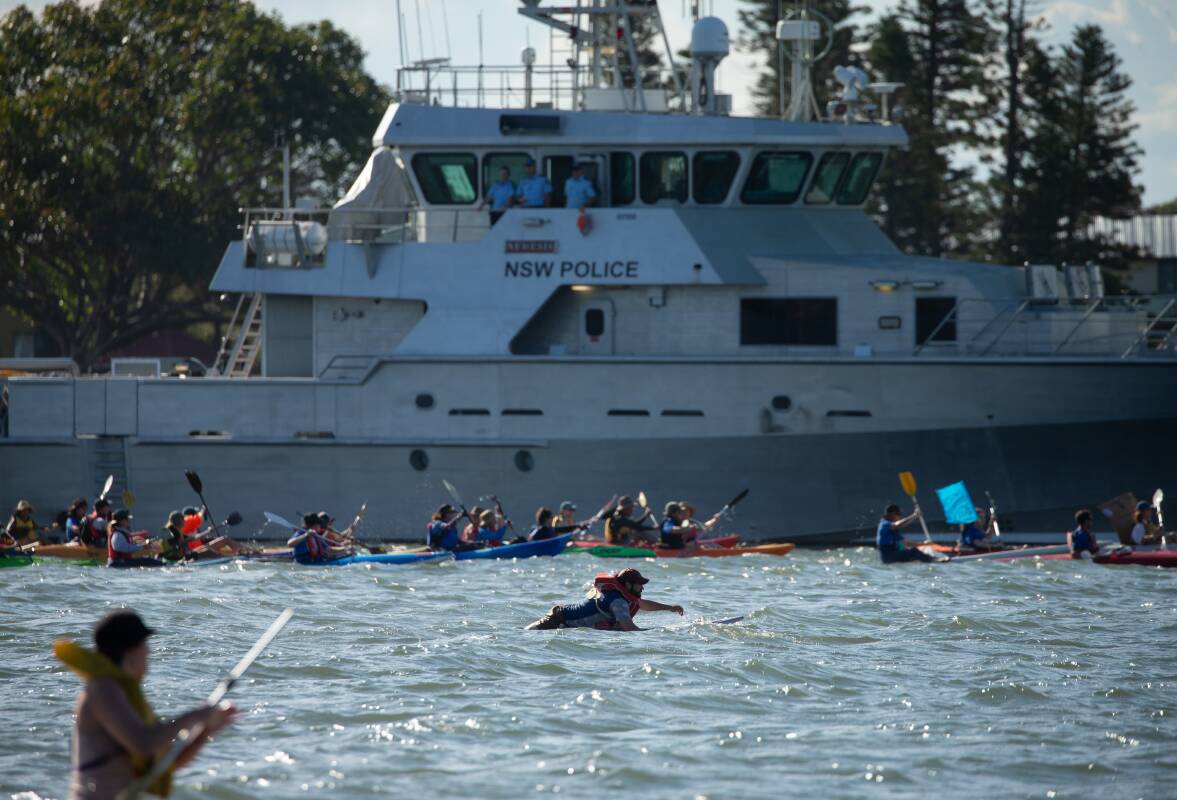Police were in the process of arresting more than 100 climate activists on Sunday afternoon at the conclusion of the three day harbour blockade.
Protesters on kayaks took to the water en masse at Horseshoe Beach shortly before 4pm.
As the expiration of the 30 hour protest permit approached a large group of supporters on the beach began to chant: "Floods, fires famine, we are terrified. We shall overcome like a rising tide."















































As the deadline passed, three rigid inflatable water police vessels approached the flotilla.
With PolAir circling overhead, the protesters drifted between various points on the harbour.

The standoff continued for about 30 minutes before police on jet skis moved in and began making arrests.
Once arrested the protesters were transported to the mobile command centre on the foreshore. Their kayaks were left to drift on the harbour.

Among those arrested was 97-year-old Uniting Church minister Reverend Alan Stuart.
"I am doing this for my grandchildren and future generations because I don't want to leave them a world full of increasingly severe and frequent climate disasters," he said earlier in the day.
The arrests were a dramatic end to an otherwise untroubled three days of activism that attracted participants from across Australia and drew media attention from around the globe.
"We've had hundreds of people out on the water and we've had thousands here on the beach," Rising Tide organiser Alexa Stuart said.
"There have been some incredible speakers, including some great Awabakal and Worimi speakers, a coal miner who shared his experience of working in the mines and of having strong concern about the climate crisis.
"At the moment there is a youth open mic where a lot of young people are sharing their fears about the future."
About 350 people on rafts and kayaks remained on the harbour in two hour shifts throughout Saturday night.
They included Nick Hopkins, who lost his home in Bateman's Bay in the black summer bushfires.
"[People must] stand up and push our government. The good life among the gum trees is lost," he said.
Valerie Thompson, from Brunswick Heads, also took to the harbour in her kayak.
She said she and many of her friends had been devastated by last year's flooding.
"We know for a fact that the fossil fuel companies were not on the ground to help us when the climate crisis actually hits," she said.
"We are calling on the government to immediately stop their senseless profiteering at the expense of our climate and our future."
Rising Tide wants the government to stop allowing new coal projects, tax fossil fuel export profits at 75 per cent to fund community and industrial transition, and pay for climate loss and damage.
It estimated the protest had stopped half a million tonnes of coal from leaving the Port of Newcastle by forcing the port to close to shipping over the weekend.
"It's been a pretty impressive effort. We expect that we will have blocked about eight coal chips, which is the equivalent of about half a million tonnes of coal," Ms Stuart said.
Meanwhile, NSW Minerals Council chief executive Stephen Galilee described the protesters as "extremists".
He said Newcastle port contributed about 2 per cent of the world's global coal supply and its exports generated billions of dollars in royalties for the state government.
It was the third time climate activists have blockaded Newcastle Harbour in the past decade.
NSW Police had granted permission for the protest to take place last week following several months of negotiations with organisers.
The harbour blockade follows the arrest of dozens of activists in April. They boarded a train at Sandgate and began shovelling coal out of its wagons.







